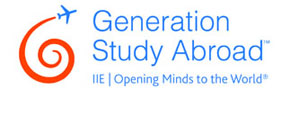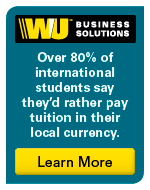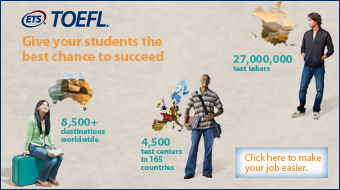
| IIE Home | Membership | Publications | Open Doors | Contact Us | Subscribe |
|
||||||||||||
|
||||||||||||
|
News
Peter Allen, Program Officer for IIE's Global Exchange Operations, shares about the inaugural International Conference on Open and Flexible Education in Hong Kong. "There was a palpable build-up of excitement over the sheer potential of open and online learning to change the fundamental paradigms of higher education," writes Allen.
The Pie News reported last week on the recently released DAAD Strategy 2020, which includes attracting 350,000 foreign students by 2020 and increasing the number of Germans who study abroad to 50%. The article outlines various ways the government-funded German Academic Exchange Service (DAAD) plans to support German institutions "to meet future challenges in global education."
Rahul Choudaha on his blog DrEducation gives highlights of comparative chart showing "worldwide certificate attainment" of students registering for HarvardX and MITx. For example,
Arkansas State University will build a new campus in Mexico, which will open in 2015 and eventually enroll up to 5,000 students in courses taught in English by faculty approved by Arkansas State. A recent University World News article reports on the new campus and other initiatives between Mexico and the United States for enhancing education collaboration.
China is catching up as a top global player in research and development in technical higher education. Wachira Kigotho reports in the University World News on findings in the 600-page Science and Engineering Indicators 2014 report by the National Science Board. "In the last two decades, China has been rapidly raising its research and development, or R&D, intensity by devoting more money to science and technology" writes Kigotho. "It is now the world’s third largest producer of peer-reviewed research articles after the European Union and United States."
The American Council of Education's Center for Internationalization and Global Engagement (CIGE) has released of the first two editions of CIGE Insights: Global Higher Education—a series of papers exploring key issues and themes faced by higher education institutions around the world.
This paper explores issues discussed by North American and European institutional leaders at the summer 2012 Trans-Atlantic Dialogue, including the impact of the economic downturn on internationalization efforts, the role of student mobility, curriculum and co-curriculum in internationalization, language and cultural issues inherent in global engagement, and student learning assessment.
This paper explores key issues surrounding the global engagement of higher education and asserts that institutions are better served in partnerships abroad if they have undergone the process of comprehensive internationalization first. Topics include models for collaboration, institutional "foreign relations" policies, fiscal motivations for global engagement, and higher education's role in national interests and public diplomacy.
Conferences
Teaching and Learning: Achieving Quality for All
March 19, 2014, 3:30–5:00 PM
Institute of International Education
809 United Nations Plaza, 12th Floor, New York, NY
Registration Deadline: March 12, 2014 | Register Online
IIE and the U.S. National Commission for UNESCO invite you to a policy briefing and discussion on the Education for All Global Monitoring Report 2013/14 and its implications for U.S. domestic policy.
The Education for All Global Monitoring Report 2013/14 was launched in Addis Ababa, Ethiopia, on January 27, 2014 with side events taking place in countries around the world. This year’s report provides a critical assessment of progress and challenges towards achieving the Education for All goals. It puts forward an analytical overview of the state of teaching and learning event with reference to achieving quality education for all. This is an issue of critical importance given increasing acknowledgement of the "learning crisis" in education and funding gap for basic education around the world.
The key lessons and findings from the report will be presented to frame the discussions. The moderator will pose questions, based on key themes or findings, to the discussants and other participants. At the end, the moderator will provide a summary and conclusions.
May 18-21, 2014
Bloomington, Indiana
Registration Deadline: April 14, 2014 | Registration and Conference Details
The Center for the Study of Global Change at Indiana University Bloomington, will hold its annual Institute for Curriculum and Campus Internationalization (ICCI) on May 18-21, 2014 in Bloomington, IN. This unique institute facilitates campus, curriculum, and course internationalization. It includes two tracks with unique guided workshops (Course Focus and Campus Focus) as well as the Global Mini-Conference "Global Issues in World Regions," a session on the intersections of diversity and internationalization, a poster session for sharing participants’ best practices, and a multi-regional cultural evening for networking.
June 15–17, 2014 | Bordeaux
Early Registration Deadline: May 26, 2014 | Registration and Conference Details
Registrations are now open for the Academic Cooperation Association (ACA) Annual Conference 2014. The conference will be co-organized by the Agence Europe-Education-Formation France and is expected to draw an audience of 300+ participants from Europe and beyond.
The 2014 Annual Conference bears the title "Europe in the World: Higher Education Trends Across the Globe. It will:
Deadlines
Round 1 Application Deadline: March 17, 2014 | Application and Program Details
The Carnegie African Diaspora Fellowship Program is seeking applications for fellowships and host institutions:
Projects can be conducted in the African host country for between two weeks and one semester (14-90 days). For the fellowship, the African Diaspora Fellow will receive:
For more information, contact africandiaspora@iie.org.
IIE manages the fellowships and payments to fellows. Host institutions are encouraged to provide cost-share for the fellow’s meals, lodging and in-country transportation during the project. The program is funded by Carnegie Corporation of New York (CCNY) and guided by an Advisory Council led by Quinnipiac University (QU).
Application Deadline: March 19, 2014 | Application and Fund Details
The Indigenous Biocultural Exchange Fund (IBEX), a project administered by IIE and supported by The Christensen Fund, provides financial assistance of up to $5,000 to an individual or organization to attend global biocultural events/exchanges or meetings of international significance which impacts the applicant’s home territory or region. This fund supports indigenous peoples and local communities to have a voice in the policies and forums that concern biocultural diversity at a global level.
Eligibility requirements:
For questions, please contact Vanessa Sayajon at IBEX@iie.org.
Postdoctoral Researchers International Mobility Experience (P.R.I.M.E.)
Application Deadline: March 31, 2014 | Application and Program Details
With this new program, and funding from the Federal Ministry of Education and Research (BMBF) and the European Union, DAAD provides support for international mobility for postdoctoral researchers. Researchers of all nationalities, who see their long-term career unfolding in Germany, will be given the opportunity to combine the association with a German university with a research stay abroad. There are no restrictions as to the country of destination as long as the applicant has not stayed in the respective country for more than 12 months in total during the three years up to March 31, 2014.
Application Deadline: July 1, 2014 | Application and Fellowship Details
The Rotary Foundation is now accepting applications for the world-competitive Rotary Peace Fellowship. The fellowship provides academic and practical training to prepare scholars for leadership roles in solving conflicts around the world.
Up to 100 fellows are selected every year in a globally competitive process based on personal, academic, and professional achievements. Fellows earn a master’s-level degree or a professional development certificate in peace and conflict studies at one of six Rotary Peace Centers at leading universities in Australia, England, Japan, the United States, Sweden, and Thailand.
Over the past 12 years, Rotary Peace Centers have provided close to 800 future peace leaders with peace and conflict resolution education and field experience. Rotary alumni work all over the world with organizations ranging from grassroots peace initiatives in Africa to the United Nations.
Proposal Deadline: April 1, 2014 | Proposal and Competition Details
Partners of the Americas, NAFSA Association of International Educators, and the U.S. Department of State are requesting proposals for the 100,000 Strong in the Americas Innovation Fund grant competition for higher education institutions. The Innovation Fund is President Obama’s education initiative for the Western Hemisphere. It is designed to foster region-wide prosperity through increased higher education, study abroad, and collaboration. The competition is open to all higher education institutions in the Western Hemisphere and is funded by the generous contributions of Santander Universities, a division of Banco Santander.
Study Abroad
 The Institute of International Education has officially launched Generation Study Abroad, a five-year initiative that brings leaders in education, business, and governments together to double the number of U.S. college students studying abroad. IIE has already identified more than 160 lead partners who have committed to specific, measureable actions that will help reach this ambitious goal; the result will be thousands more American students graduating with the international experience necessary for success in a globalized world. The Institute of International Education has officially launched Generation Study Abroad, a five-year initiative that brings leaders in education, business, and governments together to double the number of U.S. college students studying abroad. IIE has already identified more than 160 lead partners who have committed to specific, measureable actions that will help reach this ambitious goal; the result will be thousands more American students graduating with the international experience necessary for success in a globalized world. Scholar Rescue Fund
Established with gifts from IIE Trustees Robert L. Dilenschneider and Mark A. Angelson, the Janet Hennessey Dilenschneider Scholar Rescue Award in the Arts will provide life-saving fellowships to 10 threatened scholars in fields such as painting, dance, music, architecture, and the performing arts. The Award becomes part of IIE's Scholar Rescue Fund, which over more than a decade has rescued 525 scholars from more than 50 countries.
"The world is in turmoil and we are in danger of losing the creativity contributed by artists, writers, musicians, if we don’t rescue them from oppression. The record of our time should be from the arts and not the computer chip," said Janet Hennessey Dilenschneider.
Join us:
|
| www.iie.org/iienetwork • Member website of the Institute of International Education © 2025 Institute of International Education. All rights reserved. |



